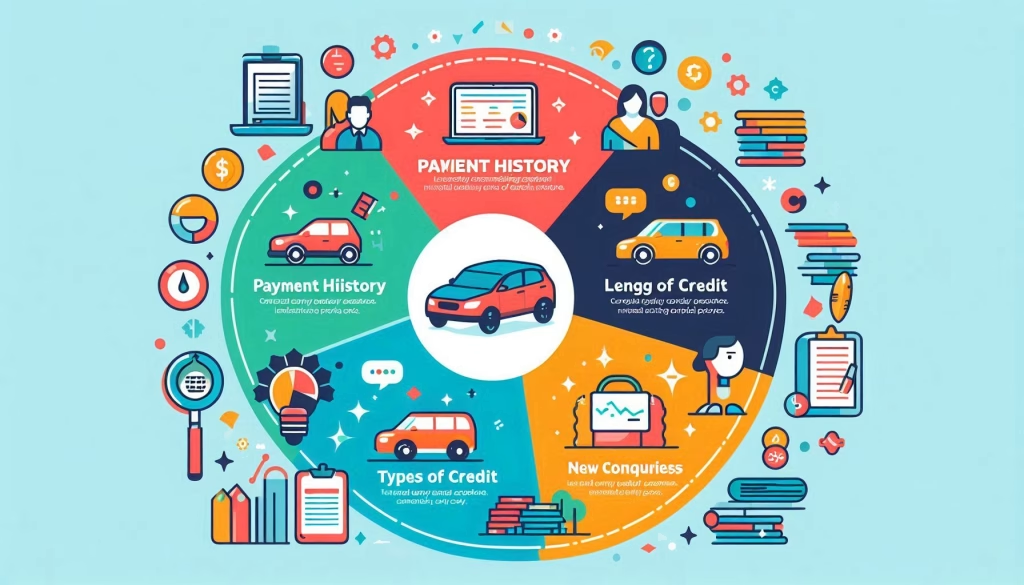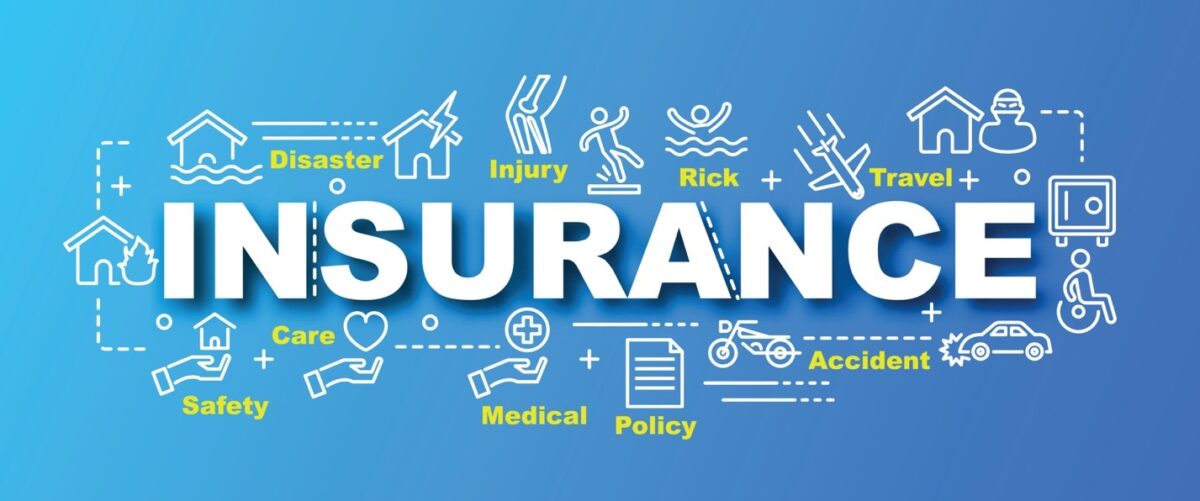Table of Contents
Overview
A credit score is commonly used to assess creditworthiness. A poor credit score can make it challenging to secure a loan from banks, cooperatives, or online lenders. Conversely, a good credit score generally means that obtaining loans is more straightforward.
A credit score is influenced by an individual’s previous credit history. Credit bureaus manage customers’ credit scores based on loan reports from financial institutions, which are reported. To improve your credit score, ensure that you pay loans on time and for the correct amount.
5 Factors Affecting Credit Score

There are several factors that can affect a customer’s credit score, including:
Factors Affecting Credit Score No.1
InsuranceWhat.com
Debt Payment History
The primary factor considered is the history of debt payments in recent months. The credit bureau will assess aspects such as:
- Whether or not the customer is right in paying debts
- Debt repayment timeframes can vary, including options such as 1, 3, 6, or 12 months, and sometimes even longer periods.
- A history of late debt payments can negatively impact a credit score, while the absence of such a history can contribute to a good credit score.
Hence, it’s important to pay your debts promptly, regardless of whether they are large or small amounts. Setting a reminder on your smartphone can help you avoid late payments.
Factors Affecting Credit Score No.2
InsuranceWhat.com
The Amount of Customer Debt
The magnitude of debt can influence your credit score. A large debt, if paid punctually, may not harm your credit score. Conversely, even a small debt can lower your credit score if you struggle to make timely payments.
It’s important to remember that the amount of debt should be proportionate to the credit limit set by banks or financial institutions. Exceeding your credit limit can result in future loan applications being declined.
Factors Affecting Credit Score No.3
InsuranceWhat.com
Many Customer Credit Accounts
How many credit accounts have you used to date? The more credit accounts, the lower your credit score will be. This indicates that your personal cash flow is in trouble, so you borrow here and there to pay off debts.
Considering the high credit riskRisk Risk is a loss that occurs to the insured individual or object. Various bad possibilities could happen to someone., it’s understandable for a loan application to be declined at a later stage. This is due to the significant indications of potential defaults or bad loans, leading banks or financial institutions to avoid such risksRisk Risk is a loss that occurs to the insured individual or object. Various bad possibilities could happen to someone..
Factors Affecting Credit Score No.4
InsuranceWhat.com
Types of Debt
The subsequent factor to consider is the kind of debt you possess. It is crucial to be aware of the various debt types, which include:
- Online loans
- Credit card debt
- Mortgages
Having a variety of debt types can improve your credit score, provided that payments are made consistently. However, it’s not necessary to take on debt from multiple sources just to boost your credit score; it will naturally improve with regular, timely payments.
Factors Affecting Credit Score No.5
InsuranceWhat.com
Debt Period
Another factor affecting your credit score is the length of your debt repayment period. Generally, a longer repayment duration is considered better. This is why numerous financial advisors recommend consistently using credit cards and paying off bills promptly to improve your credit score.
For those who have never applied for a loan, there is no need for concern. Provided that your financial condition is stable, banks or other financial institutions will offer loans as long as you fulfill the required terms and conditions.
7 Tips for Building a Good Credit Score

A poor credit score isn’t the end of the road; you can enhance it by following one of these seven tips.
Tips for Building a Good Credit Score No.1
InsuranceWhat.com
Pay Debts on Time
The easiest way to improve your credit score is by paying off your debts promptly. It’s important to maintain a payment history for at least the last six to twelve months to ensure a good credit score.
Avoiding late payments, particularly on small installments, is crucial as even minorMinor Policyholders who are under 21 years of age. amounts can significantly affect financial health. Make timely payments to reduce your financial burden in the following month.
Tips for Building a Good Credit Score No.2
InsuranceWhat.com
Avoid Minimum Payments
All customers, particularly those using credit cards, are permitted to make minimum payments. However, it’s important to understand that consistently making only the minimum payment can lead to a gradual decline in your banking credit score.
Making only the minimum payment can signal financial distress. Moreover, the likelihood of this recurring in subsequent months is high, which could inevitably reduce your credit score. Therefore, it’s advisable to settle the bill in full, as per the stated amount, to demonstrate your commitment to financial health.
Tips for Building a Good Credit Score No.3
InsuranceWhat.com
Avoid Overlimit
Credit card users are permitted to spend beyond their given balance, known as the overlimit. However, this can lead to increased consumption, which may wreak havoc on one’s financial health. Moreover, the likelihood of a significant decline in credit scores is substantial.
It’s advisable to safeguard your loan allowance for the upcoming months by using a smaller portion, such as 30% to 50% of the allotted limit. This way, if you require funds in the future, you can utilize the remainder of your allowance without exceeding the limit. Ensure you make payments on time to continually enhance your credit score.
Tips for Building a Good Credit Score No.4
InsuranceWhat.com
Start with Small Loans
If your primary objective is to enhance your credit score, consider starting with a small loan application. Opt for an amount that is 10% to 15% of your total salary to ensure it doesn’t strain your finances and you can manage the repayments comfortably.
It is advisable to allocate funds based on the nominal loan amount following a transaction or salary receipt. This ensures that the money is not diverted to finance unnecessary items. Prioritizing debt repayment is crucial for maintaining a sound financial state.
Tips for Building a Good Credit Score No.5
InsuranceWhat.com
Consider the Implications Before Closing a Credit Card
Irresponsible use of credit cards can result in widespread debt. Hence, it is crucial to utilize credit cards judiciously to reap various benefits. These include 0% installment plans, converting credit card points into miles, obtaining shopping vouchers, enjoying cashback, and more.
There’s no need to hastily close your credit card, even if it’s seldom or never used. Credit cards can be a tool to enhance your credit score over time. Maintaining a good score may increase your chances of securing a substantial loan from the bank, which could be used to start a business, purchase a home, or acquire a vehicle.
Tips for Building a Good Credit Score No.6
InsuranceWhat.com
Review Your Credit Report
Remember to regularly review your use of credit cards, pay-later services, mortgages, and online loans. Evaluating your financial management through reviews can highlight areas for improvement. By addressing these in subsequent loans, you can ensure a consistently rising credit score.
Utilizing the services of a financial advisor is advisable if you encounter difficulties in managing your finances, especially when your transactions are substantial, varied, and complex. However, if your financial activities are minimal, hiring a financial advisor may be unnecessary and could lead to wasteful spending.
Tips for Building a Good Credit Score No.7
InsuranceWhat.com
Repeat
To further enhance your credit score, consistently apply the six tips previously outlined. Ensure that the amount of any loan requested stays within your financial means to avoid payment difficulties. Moreover, steer clear of minor errors that could affect your financial health.
This occurs because numerous customers become complacent with their good credit scores and start neglecting their installment payments on time. Consequently, their credit score gradually declines, and restoring it to its former state demands twice the effort. To prevent this, setting up an auto-debit payment system can help ensure installments are paid without fail.

The Conclusion
Avoid Allowing Minor Errors to Negatively Impact Your Credit Score
This concludes the discussion on improving credit scores and the factors influencing them. It’s crucial to be informed and judicious regarding your credit score, as it forms the basis for loan applications, particularly for substantial amounts. For instance, this applies when seeking loans for home ownership, vehicles, or business capital.
Besides credit, it’s also important to monitor how you manage your debit transactions and the funds in your savings account. Demonstrating good and meticulous management indicates that you handle your finances prudently, which can assure banks and financial institutions of your reliability when considering future loan applications.
Do you think you have other ideas about Credit Score Strategies: 7 Key Tips for Improvement? You can comment and share your thoughts below, or discuss more in the InsuranceWhat Forum. Also, read more articles about GLOBAL INSURANCE or other interesting insurance topic articles only at InsuranceWhat.com.






